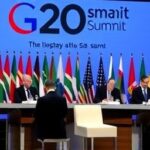Belém, Brazil – The United Nations’ COP30 climate conference wrapped up on Saturday amid widespread frustration, as world leaders failed to agree on a concrete plan to phase out fossil fuels. This shortfall has ignited alarms across financial markets, with experts warning that the absence of a clear timeline could derail trillions in green investment and complicate the global economy’s shift toward sustainability.
The three-week gathering, hosted in the Amazon rainforest city of Belém, drew over 100 heads of state and thousands of delegates. Hopes were high for a landmark deal following the COP28 pledge in Dubai to transition away from fossil fuels. Instead, the final text offered vague commitments to ‘accelerate’ the shift, leaving climate advocates decrying it as a missed opportunity in the face of escalating global warming.
UN Secretary-General António Guterres addressed the closing plenary, stating, ‘We arrived at COP30 with the planet on the brink, and we leave with promises that ring hollow without action. The fossil fuel era must end, but today’s outcome delays the inevitable.’ His words underscored the tension between ambitious rhetoric and geopolitical realities, particularly from major oil-producing nations.
Intense Negotiations Stall on Fossil Fuel Timelines
Behind closed doors at the COP30 venue, negotiations dragged into the early hours of Saturday, focusing on the contentious issue of fossil fuels. Delegates from the European Union and small island nations pushed for a binding 2030 deadline to begin phasing out coal, oil, and gas, citing the Intergovernmental Panel on Climate Change (IPCC) reports that warn of irreversible damage if emissions aren’t halved by 2030.
However, opposition from OPEC countries, including Saudi Arabia and Russia, proved insurmountable. A Saudi delegate, speaking anonymously, revealed that their bloc insisted on ‘equitable transition’ language that protects their economies, which rely on fossil fuels for up to 90% of export revenues. The resulting compromise text calls for ‘efforts to limit’ fossil fuel expansion but stops short of a phaseout roadmap, a move critics labeled as greenwashing.
Statistics from the International Energy Agency (IEA) highlight the stakes: Global fossil fuel subsidies reached $7 trillion in 2022, dwarfing the $1.3 trillion invested in clean energy that year. At COP30, Brazil’s President Luiz Inácio Lula da Silva, the conference host, attempted to bridge divides by proposing a $100 billion annual climate finance fund increase, but even this fell through without firm fossil fuel concessions.
Environmental groups like Greenpeace documented over 1,500 fossil fuel lobbyists in attendance – more than delegates from the 10 most climate-vulnerable nations combined. This imbalance fueled accusations that corporate interests hijacked the climate conference, prioritizing short-term profits over long-term planetary health.
Climate Activists Rally Against COP30’s Weak Outcomes
Outside the convention center, thousands of protesters gathered under banners reading ‘Phase Out Fossils Now!’ As the gavel fell on the inconclusive talks, frustration boiled over into chants and marches through Belém’s streets. Greta Thunberg, the Swedish activist who flew in for the final days, told reporters, ‘COP30 is another COP-out. World leaders talk big on climate but deliver nothing when it counts. The global economy can’t afford this delay.’
Indigenous leaders from the Amazon, whose lands are ground zero for deforestation linked to fossil fuel-driven agriculture, expressed betrayal. A representative from the Coordinator of Indigenous Organizations of the Brazilian Amazon (COIAB) stated, ‘We’ve hosted this conference on our territory, yet the decisions ignore our voices and the forests that absorb the world’s carbon.’ Reports indicate that Amazon deforestation surged 20% in 2023, exacerbating the very emissions the climate conference aimed to curb.
Youth activists, organized under the Fridays for Future banner, staged a symbolic ‘die-in’ to represent lives lost to climate disasters. One participant, 18-year-old Sofia Mendes from Portugal, shared her story: ‘My coastal hometown was flooded twice this year due to rising seas. COP30’s failure means more youth like me will inherit a broken planet.’ Their actions amplified calls for holding fossil fuel executives accountable, with petitions garnering over 2 million signatures worldwide during the event.
The activist backlash has already rippled into public opinion. A pre-conference poll by Ipsos showed 72% of respondents in 30 countries supporting a full fossil fuel phaseout by 2040, up from 65% in 2022. Post-COP30 surveys suggest this support could translate into pressure on governments, potentially influencing upcoming elections in the US and EU.
Economic Ripples: Green Investment Takes a Hit Post-COP30
The lack of a fossil fuel phaseout plan at COP30 is sending shockwaves through the global economy, where investors had anticipated clearer signals to pivot toward renewables. BloombergNEF analysts estimate that a robust agreement could have unlocked $4 trillion in green investment by 2030, funding solar, wind, and battery storage projects essential for net-zero goals.
Instead, stock markets reacted swiftly: Shares in renewable energy firms like Ørsted and Vestas dipped 5-7% on Monday, while oil giants such as ExxonMobil saw modest gains. The delay raises doubts about the stability of carbon pricing mechanisms; the EU’s Emissions Trading System, for instance, saw carbon permit prices fluctuate wildly, ending 3% lower after the conference.
Developing economies, particularly in Africa and Asia, stand to suffer most. The World Bank projects that without accelerated green investment, these regions could lose $2.7 trillion in GDP by 2030 due to climate impacts. At COP30, finance ministers from G77 nations demanded technology transfers from wealthy polluters, but the talks yielded only non-binding pledges. Indian Climate Minister Bhupender Yadav remarked, ‘The global economy’s transition must be just, or it won’t happen at all. Fossil fuels built the North’s wealth; now they block the South’s path to clean energy.’
In the US, where the Inflation Reduction Act has spurred $110 billion in clean energy projects since 2022, business leaders are wary. Tesla CEO Elon Musk tweeted post-conference: ‘COP30’s inaction is a setback for innovation. Governments need to step up or the market will punish fossil fuel laggards.’ This sentiment echoes across Wall Street, with JPMorgan Chase forecasting a 15% slowdown in green bond issuances if phaseout ambiguity persists.
- Key Economic Indicators Post-COP30:
- Renewable energy ETF (TAN) down 4.2%
- Fossil fuel index (XLE) up 2.1%
- Global clean energy investment pledges: Stagnant at $1.7 trillion annually
Experts warn that prolonged uncertainty could inflate energy prices, as seen in Europe’s 2022 crisis when Russian gas supplies faltered. The IEA notes that without a phaseout plan, fossil fuel demand might peak later than the projected 2025, locking in higher emissions and economic volatility.
Major Powers’ Stances Shape COP30’s Fractured Legacy
Geopolitical fault lines defined COP30, with major powers digging in on fossil fuels. China, the world’s largest emitter, advocated for ‘common but differentiated responsibilities,’ emphasizing that developed nations should lead the phaseout while providing aid. Beijing committed to peaking emissions before 2030 but resisted global timelines, citing its coal-dependent growth model that powers 60% of its electricity.
The United States, under President Joe Biden, arrived with a progressive agenda, pledging an additional $11 billion in international climate finance. Yet, domestic politics loomed large; with elections looming, US negotiators avoided hard commitments that could alienate fossil fuel states like Texas. Special Climate Envoy John Kerry stated, ‘We’ve made strides in domestic green investment, but global coordination is key to stabilizing the economy.’
Oil-rich Gulf states formed a united front, leveraging their hosting of COP28 to argue for ‘managed decline’ rather than abrupt phaseout. The UAE’s Sultan Al Jaber, who presided over COP28, attended COP30 and pushed for hydrogen and carbon capture as bridges, technologies that could extend fossil fuel lifespans. Meanwhile, the EU bloc, representing 8% of global emissions, offered the most ambitious proposals, including a 55% emissions cut by 2030, but couldn’t sway the consensus.
Brazil’s hosting added a unique layer, with Lula highlighting the Amazon’s role in carbon sequestration. Yet, internal challenges – including illegal mining fueled by global demand for fossil fuel-linked commodities – undermined the narrative. A leaked diplomatic cable revealed tensions between Brazil and indigenous groups over unfulfilled promises from prior COPs.
Ol>
- China’s Position: Focus on tech transfer, no binding phaseout.
- US Stance: Increased finance pledges, but election-year caution.
- EU Push: Aggressive targets, frustrated by lack of buy-in.
- OPEC Resistance: Protect economic interests, promote offsets.
This divergence leaves the global economy in limbo, as trade policies and supply chains remain tied to fossil fuels.
Charting the Path Forward After COP30 Disappointment
As the dust settles on COP30, attention shifts to interim mechanisms that could salvage momentum. The ‘Loss and Damage’ fund, established at COP27, received initial pledges totaling $700 million at this conference – a fraction of the $400 billion annually needed by vulnerable nations. Activists are now mobilizing for COP31 in 2026, hosted by Australia, where ocean-focused talks might pressure coastal polluters.
Private sector innovation could fill the void left by governmental inaction. Initiatives like the Race to Zero campaign have enrolled 13,000 entities committing to net-zero by 2050, driving green investment despite COP30’s letdown. Venture capital in clean tech hit $50 billion in 2023, per PitchBook data, suggesting market forces may outpace diplomacy.
Looking ahead, the Glasgow Financial Alliance for Net Zero (GFANZ) plans to convene bankers in Davos next year to align trillions in assets with phaseout goals. Economists predict that regulatory pushes, such as the EU’s Carbon Border Adjustment Mechanism, will incentivize cleaner supply chains, potentially adding 1-2% to global GDP growth through sustainable jobs.
Yet, without a fossil fuel roadmap, risks mount. The World Meteorological Organization forecasts 2024 as the hottest year on record, with extreme weather costing $250 billion last year alone. Nations like Bangladesh, facing annual floods displacing millions, urge swift action: ‘The global economy thrives on stability; climate chaos is the ultimate disruptor.’
In this pivotal moment, COP30’s failure underscores the urgency for hybrid solutions – blending public policy with private innovation – to secure a fossil-free future and bolster the global economy against mounting climate threats.








